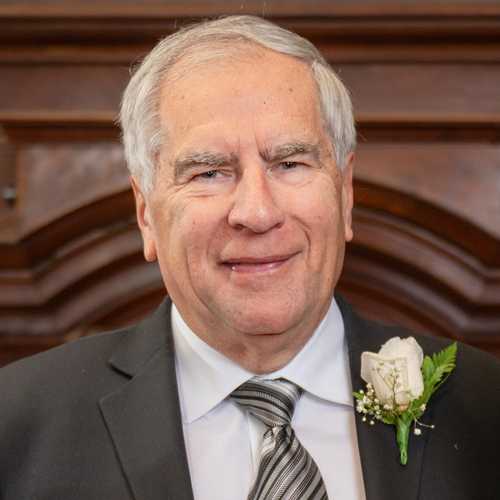Joseph E Bulsak
BA, MS, FCPP
Physicist, Health Science Consultant, and U.S. Marine
Fellow Since 2024


Published August 2025
As an accomplished, team-oriented professional, Joe Bulsak applies his technology and management skills to help health science organizations deliver treatments effectively. He enhances critical communications, collaboration, processes, training tools, and operational efficiency, freeing essential resources for R&D and treatment development.
A Fellow since Spring 2024, Mr. Bulsak has committed to advancing the College's mission through his service to health science organizations and professionals. We spoke with Mr. Bulsak about his multifaceted career, his passion for the College, and the future of the health sciences field.
Hello Mr.Bulsak. What drew you to the College to seek Fellowship?
I was attracted to the College’s mission of advancing the cause of health while upholding the ideals of medicine. After decades of delivering management and technology solutions to health science organizations, I wanted a wider forum to share my knowledge and to accelerate my learning. I have benefitted from being a member of exceptional “organizations”: the environment that my mother and father created that taught me honor and integrity as a child; La Salle University, which challenged me but didn’t let me flounder; the U.S. Marine Corps which intensified my understanding of teamwork; and the College which affords me unprecedented opportunities to contribute and learn from highly respected colleagues.
With the 250th anniversary of the signing of the Declaration of independence coming up next year, it’s amazing to think that the College has been around for almost as long. What did it mean to you to be inducted to the Fellowship?
Philadelphia has a deep history in the founding of this great country, and the College has deep roots in the history of medicine. The College was founded by physicians in Philadelphia in 1787, less than a decade after the signing of the Declaration of Independence. The genesis of both this country and the College overlap and align. Perhaps the foremost inductee is Benjamin Rush. To be included in this long lineage of medicine is an honor.
What challenges and/or opportunities do you see in the Health Sciences in the next decade? How can the College be a leader in addressing these issues?
I believe there are two fundamental challenges facing health science: the uncertainty due to tariffs and the application of technology, specifically AI. The College’s breadth can offer forums where policymakers, leaders in academia and medicine can come together to, for example, offer views of the short- and long-term impact of tariffs or on the impact of technology on health science with a focus on ethics.
Your career has been deepened by degrees in Physics (BA) and Engineering (MS), and enhanced by success in leadership roles including serving in the U.S. Marine Corps. Knowing what you know now, what advice would you have given yourself when you were first starting out?
I would emphasize the importance of advanced study in the ability to contribute to the research or clinical aspect of health science.
As someone who has worked on numerous teams as a Brand Executive and Program Manager, and currently a member of the La Salle University Alumni Association Board of Directors, how do you stay motivated? How do you motivate members of your team and fellow Board members?
Being highly motivated is my DNA. Whether in neighborhood swim clubs and food kitchens or honoring military veterans and helping La Salle University students prepare for challenging careers, I have always felt a need to contribute. I motivate others by ensuring they understand how important their contributions are, regardless of their role. Everyone can make a difference.
What have been the most rewarding parts of your consulting career?
Helping others achieve their goals and ensuring their goals are consistent with a meaningful outcome. Early in my consulting career, I learned that completing an engagement on budget and on schedule that doesn’t address the root cause of an issue or move the ball forward may bring a degree of satisfaction, but not cause for jubilation. I train my consultant teammates to understand the problem before conceptualizing a solution, like an HCP would do before prescribing a treatment.
You’ve traveled across North America, South America, Europe, Asia, Australia, and New Zealand for both speaking and business and technology engagements. What were your takeaways from these exchanges and the sharing of information?
Multinational engagements have taught me that teams outside the US accomplish goals in different ways. What is important is the result and the outcome, not what language is spoken or the path taken to its success.
Can you tell us about one of your favorite items in the Library or Museum, or your favorite aspect of the College?
Having dedicated much of my life to studying the principles of physics, seeing a specimen of Albert Einstein’s brain was captivating. On the College side, my favorite aspect is the camaraderie and the networking. Being a physicist and health science consultant, my views may not overlap with Healthcare Professionals and researchers, but the conversations are enlightening, especially when I discuss the concept of institutional branding and assessing the quantitative value of research.
What do you wish more people knew about the College?
The contributions that the College has made and continues to make to health beyond the Museum would enhance the public’s appreciation of the College. A general knowledge of the learning events and networking opportunities would enhance the College’s attractiveness to the local community. I think the Fellows proactively promoting the College and its premier learning events would effectively advance its value.